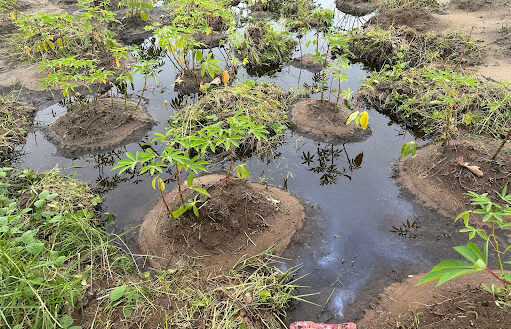In the heart of Nigeria, a region once known for its lush, verdant landscapes and bountiful waters is now the epicenter of an environmental catastrophe. The Niger Delta, a vast network of rivers, creeks, and mangroves, is being slowly suffocated by a persistent and insidious enemy: crude oil. While the world’s attention often shifts to the global energy market and the profits reaped from the Delta’s resources, a grim reality unfolds on the ground. A special report reveals a harrowing truth: the very communities that have been the lifeblood of this region for generations—the farmers and fishermen—are being brought to their knees as an unending stream of oil spills poisons their land and water, destroying their livelihoods and threatening their very existence.
ALSO READ: https://nationscuriosity.com/just-in-can-nigerias-military-win-the-war/
For decades, the rhythm of life in the Niger Delta has been dictated by the seasons of planting and harvesting, and the ebb and flow of the tides. Families have relied on the fertile soil to cultivate staples like cassava, yam, and plantain, and on the rich aquatic life to provide a steady source of food and income. This ancient way of life, however, is now a memory for many. The once-fertile farmlands have turned into barren wastelands, the soil hard and unyielding, saturated with the toxic sludge of crude oil. Locals recount stories of planting seeds only to have them rot in the ground, of crops that wither and die, and of meager harvests that barely fill a handful of bags where once there were dozens.
The damage extends far beyond the land. The intricate web of creeks and rivers, the arteries of the Niger Delta, have become polluted highways of oil. Fishermen, who once cast their nets with the confidence of a guaranteed catch, now return with empty boats, their nets snagged on the viscous tar. Studies have shown a devastating impact on the aquatic ecosystem, with fish populations dwindling and traditional fishing grounds becoming uninhabitable. The economic toll is immeasurable. A fisherman who could once earn a daily living is now struggling to put food on the table for his family, a farmer who once paid for his children’s school fees with his harvest now watches helplessly as his crops fail.
The causes of this environmental crisis are complex and contentious. While oil companies often point to sabotage and illegal refining by locals as the primary culprits, many residents and environmental experts argue that the issue is far more deeply rooted. They cite aging pipelines, some of which are more than two decades old, and a lack of proper maintenance and inspection. The sheer scale of the oil infrastructure in the region, with its extensive network of pipelines and flowlines, makes it highly susceptible to corrosion and leaks. The chronic nature of the contamination is a major obstacle, as spills of varying magnitudes from dilapidated infrastructure and transport activities constantly re-pollute the environment, even after so-called cleanup efforts.
And the cleanup? It’s often a slow and insufficient process, leaving behind a persistent stain on the land and water. The Hydrocarbon Pollution Remediation Project (HYPREP), established to clean up the heavily polluted Ogoni region, has faced heavy criticism for its sluggish pace and lack of transparency. The problem is that even when a site is “cleaned,” the lingering effects of the oil can render the soil unfit for agriculture for years to come. The oil forms a film on the soil’s surface, acting as a physical barrier that prevents proper aeration and destroys the soil’s microorganisms, making it impossible for plants to thrive.
The human cost of this devastation cannot be overstated. Beyond the loss of livelihood, there are serious health concerns. The contamination of water wells and rivers, which are the primary sources of drinking water, poses a direct threat to the health of the communities. The air is often thick with the black soot of gas flaring and oil fires, leading to respiratory issues and other health problems. This environmental degradation has created a cycle of poverty and despair, forcing many to abandon their ancestral homes in search of a non-existent alternative means of survival.
As the spills continue and the communities watch their heritage and future slip away, the question remains: for how long will this silent devastation be allowed to continue? The Niger Delta’s farmers and fishermen, the guardians of its land and waters, are crying out for a solution—a real, lasting solution that goes beyond temporary fixes and empty promises. Their survival, and the survival of a unique and vital ecosystem, hangs in the balance. It is a slow-motion disaster, a black curse that continues to spread, and for the people of the Niger Delta, the future looks bleak unless a fundamental change is made.


